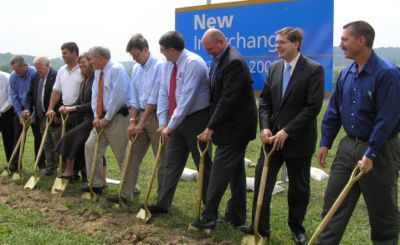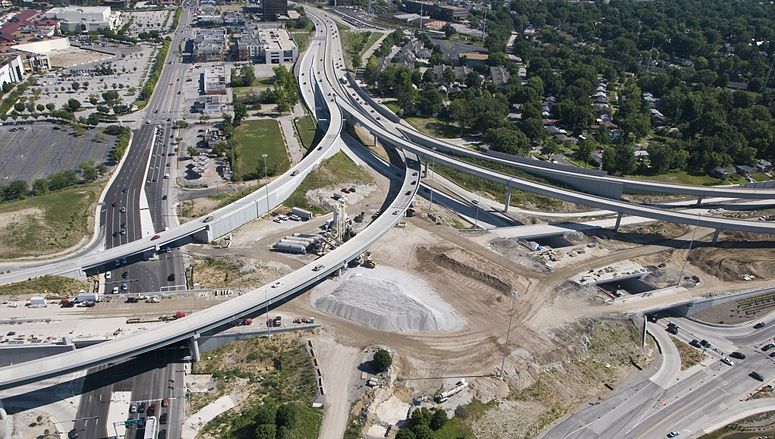Difference between revisions of "234.1 Access to Interstate Highways"
m (added links) |
m (updated three FHWA links) |
||
| Line 3: | Line 3: | ||
|colspan="2"|'''Useful Documents''' | |colspan="2"|'''Useful Documents''' | ||
|- | |- | ||
| − | |[http://www.fhwa.dot.gov/modiv/sample_outline_isar. | + | |[http://www.fhwa.dot.gov/modiv/programs/intersta/sample_outline_isar.cfm Sample Outline for Interstate System Access Requests] |
|- | |- | ||
| − | |[http://www.fhwa.dot.gov/modiv/iapp. | + | |[http://www.fhwa.dot.gov/modiv/programs/intersta/iapp.cfm FHWA Policy Prompt List] |
|- | |- | ||
| − | |[http://www.fhwa.dot.gov/modiv/idp. | + | |[http://www.fhwa.dot.gov/modiv/programs/intersta/idp.cfm Interstate Design Prompt List] |
|} | |} | ||
Revision as of 10:19, 29 April 2013
| Useful Documents | |
| Sample Outline for Interstate System Access Requests | |
| FHWA Policy Prompt List | |
| Interstate Design Prompt List | |
New or revised access to an interstate highway requires approval from FHWA. A change in access is considered as any modification to the control-of-access for right of way on an interstate highway. This includes locked gate access, access to ramps or collector-distributor roadways or other facilities that are functionally part of an interstate highway. Re-configuration of an interchange that affects the operational characteristics of an interstate highway is also considered as a change in access. Only MoDOT, as the owner and operator of interstate highways in Missouri, is authorized to submit a request for new or revised access to FHWA for consideration. Proposed changes in access to interstate highways in Missouri are presented to FHWA in the form of an Access Justification Report (AJR).
Due to the complexity of adding or revising Interstate access, FHWA has developed an Interstate System Access Informational Guide that clearly defines and explains what should be included in the request for new or revised access and the AJR. The analysis of Interstate System access changes requires the consideration of many factors including the planning, environment, design, safety, and operational context for any proposed changes. Quantifying and comparing the impacts of each of these key factors is an important aspect of ensuring any change in access protects the integrity of the Interstate System. The purpose of the AJR is to provide the information necessary for FHWA to make informed decisions on requests for new or modified access to an interstate highway. The Interstate System Access Informational Guide recognizes that AJRs should be evaluated as part of an integrated transportation system. The type of analysis necessary will vary on a request-by-request basis. At a minimum, the system analysis will include upstream and downstream interchanges, as well as the local road system feeding into the affected interchanges.
Approval for a change in access can be a two-step process developed to help MoDOT manage risk and provide flexibility. It is intended to identify serious flaws and to help ensure the investments in the subsequent phases of production, including any environmental documents, are not wasted. The first step is a finding of operational and engineering acceptability. This is accomplished through the preparation of an AJR and submission to FHWA. The second step is the final FHWA approval which constitutes a Federal Action, and as such, requires that the National Environmental Policy Act (NEPA) procedures are followed. Compliance with the NEPA procedures need not precede the determination of engineering and operational acceptability. However, final approval of access change cannot precede the completion of NEPA. Once NEPA has been completed, approval of the access change is granted as long as there are no changes to the location or design of the accepted concept.
Completion of the AJR in accordance with the Interstate System Access Informational Guide does not guarantee approval of any new access or changes to the access. However, it does provide a framework for the analysis of the potential benefits and consequences of the proposed project. Regardless of the funding source, since approval is considered a Federal Action, the project's final approval is contingent on the successful completion of the same process as used in the planning, engineering and environmental phases for any federally funded project. The improvements included in the AJR also must be adopted as part of a conforming transportation plan and transportation improvement program (TIP) or a STIP in non-urban areas to receive final approval.
A more detailed explanation of the process for reviewing and approving an AJR in Missouri can be found on the FHWA Missouri Division website. Information describing access changes that will require an AJR as well as those that will require something less than a complete AJR can be found at this location. This site should also be referenced to determine the appropriate level of FHWA approval required for the particular access change (FHWA Headquarters Office or FHWA Missouri Division Office).

